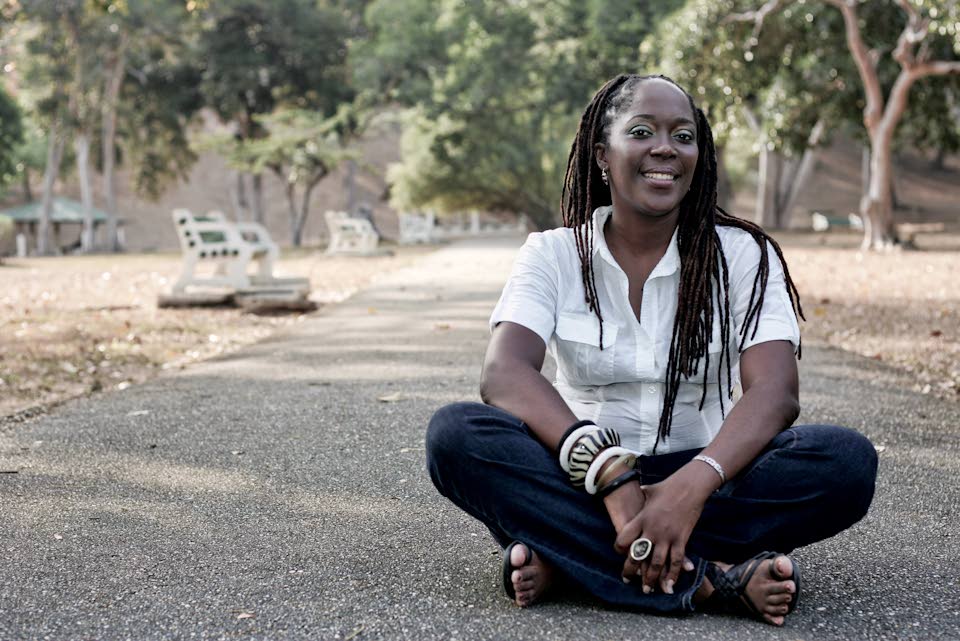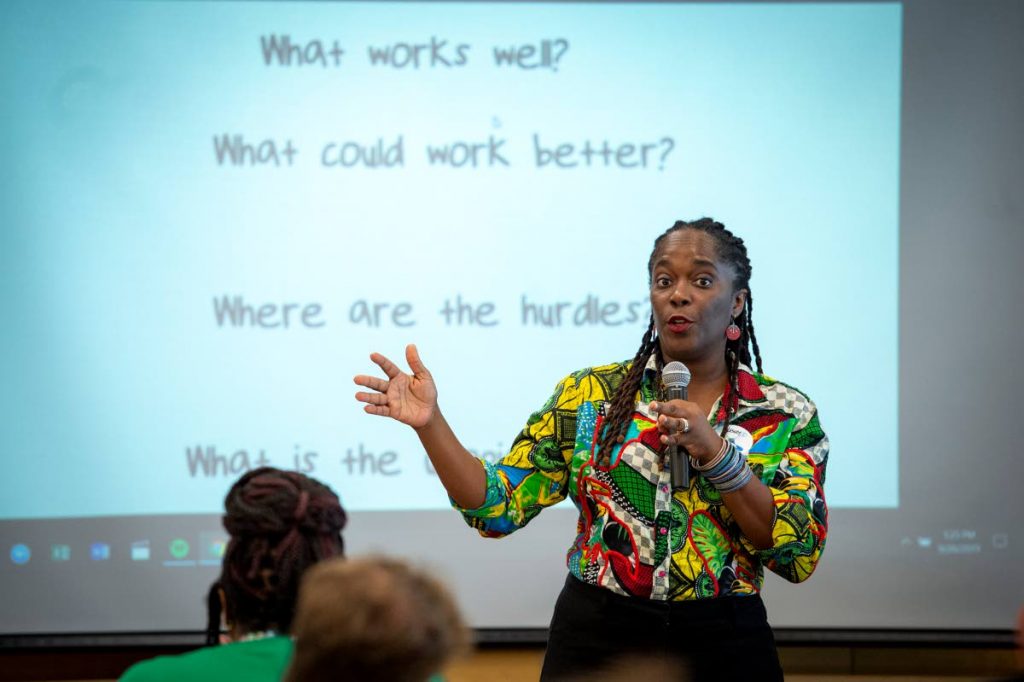TT-born designer pushes new approach in post-covid19 world

Imagine it is 2021 and efforts are still under way to find a vaccine for covid19.
In this hypothetical scenario, while vaccine research efforts are continuing, countries including TT have been able to sufficiently manage the spread of the virus.
So it is decided Carnival 2021 can proceed – but the twist is, people must still maintain physical distancing.
However, this is not a problem. Carnival costumes have been designed with skirts extending six feet and headpieces to keep people at safe distances.
To many, this hypothetical scenario may seem far-fetched but for TT-born Dr Lesley-Ann Noel, it is just one instance of how the process of design thinking can help create solutions to problems created by covid19.
“The way we govern, travel, teach, manage finances or shop…every single service that we use today has to be re-designed because the world will never be the same.
“What we are now learning (with covid19) is, the ripple effect of something like this affects every part of our lives. We need to plan innovatively to cope more effectively,” said Noel, speaking to Sunday Newsday.
Born and raised in Diego Martin, Noel is a former student of Holy Name Convent in Port of Spain and studied industrial design at the Federal University of Parana in Curitiba, Brazil.
In 1999, she created Manzanare Design, a design consultancy business, and in 2003 she opened Chic Shak Lifestyle, an ethnic gift shop in Belmont. The shop closed in 2011.
In various capacities, Noel has worked for the Organisation of Eastern Caribbean States-Export Development Unit, the Commonwealth Secretariat and was a member of the Export Promotion Council of Kenya.
In 2015, she went to the US to do a doctorate in design at North Carolina State University.
Noel is now an associate director for design thinking for social impact at Tulane University in New Orleans, Louisiana. She is also a professor of practice at the university’s Phyllis M Taylor Centre for Social Innovation and Design Thinking.
As attention shifts to what the “new normal” will look like as countries begin to adjust and recover from covid19, Noel says countries must adopt design thinking to help radically reshape learned systems and processes.
“In this approach, we are focusing on the needs and pain points of people, which is information 'big data' won't often tell us.”
“The interconnectivity of the challenges that have arisen as a result of the coronavirus has created a real need for design thinking to create mechanisms not just for us to survive but thrive.”

Using a “bottom-up” approach, design thinking ensures any decision-making process to create solutions to problems must involve the public who are affected by those decisions. This collaborative approach focuses on empathy and the needs of people to ensure solutions to problems do not create further problems for any stakeholder in a decision-making process.
Noel thinks a design-thinking approach can be used in TT, post-covid19, to improve what she considers less than optimal efficiency in government offices and the delivery of public services.
Transformative changes to TT’s national digital learning strategies, to reduce inequalities among students, can be made through this approach. In design thinking, the disparities in access to technological resources among students in every household will be integrated into remote learning decision-making and accommodated for.
For the private sector, this approach helps engineer services which reduce losses if physical distancing measures are to be maintained for a prolonged time.
In any economic transaction, design thinking pinpoints every possible scenario in the exchange of services between a customer and a service provider. When these scenarios are considered, the most effective can then be used.
Noel refers to the tourism sector as an example, saying once tourism stakeholders ask pertinent questions in creating a post-covid19 tourism strategy, the sector can quickly recover and adapt to covid19.
“How will we be able to continue to deliver a tourism product when the modes of consumption have changed?
“What is a 'low-touch' means of delivering or consuming our tourism products? Will we create intimate tourism experiences for gathering of ten persons or less?”
There is potential in the design thinking model for TT, but Noel said the government’s covid19 Roadmap to Recovery Team is not reflective of that potential. She calls on the government to include more young people and citizens who have a knowledge of the communities they serve.
“I'm giving this advice as a designer, facilitator and educator, and not as someone in government or politics.
“Young people, including university graduates, can play an active role at any step of the design thinking process that could be used in developing the post-covid19 response.
“A government-funded service innovation lab focusing on specific projects, one at a time, and including the perspectives of young people could be a way to do this.”
The potential of young people to innovatively brainstorm societal issues and provide solutions using their skill sets can be beneficial as they are part of the country’s resource pool.
Noel, however, makes it clear design thinking is not technology-centric, and technology should not be a barrier to creating solutions if the resources are not enough or present.
Design thinking is human-centred. To develop good solutions, it says, we must pay great attention to people's current needs.
“Solutions can be high or low-tech based on people's needs. Success is determined by user satisfaction.”
While the solutions created by Design Thinking may not be technologically driven, in a post-covid19 society where social interactions may be kept limited until safety is assured, technology will play a role in gathering information in the absence of human meetings which may be a challenge.
“Different kinds of technology can be used to understand, co-create with and get feedback from others.
“These can be shared documents online, social media and online collaborative whiteboards.”
Methods of collecting feedback for decision-making will need to properly consider avenues through which as many people as possible can have a say and not be excluded, especially where the input of communities will be needed.
While we are not yet in a post-covid19 world and countries may not have concrete examples to follow in terms of the role design thinking plays in covid19 recovery, Noel says countries can look to places like Singapore, Denmark, Niger, Vietnam and Chile which have used the approach to develop policies and social services.
Noel thinks design thinking, which is already present in the way many decision-making situations are approached, will become more prominent in post-covid19 societies.
Before covid19, she had already collaborated with people at the UWI's Lok Jack Global School of Business who have design thinking skills and she is certain there are people who can contribute to TT’s post-covid19 planning.
Her wish for TT?
“My dream would be for the government to develop a social service innovation lab. This lab can focus on innovating and creating solutions to specific challenges that the public identified. The lab can then co-create and implement solutions with the public.
“This lab could also focus on developing creative design thinking skills in other areas of the country. This would lead us to further development.”

Comments
"TT-born designer pushes new approach in post-covid19 world"